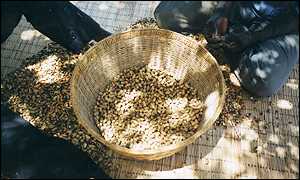| NEWS | SPORT | WEATHER | WORLD SERVICE | A-Z INDEX | ||||||||
|
| You are in: Business | |||||||||||||||||||||||||||||||||||||||||||||||||||||||||||||||||||||||||||||||||||||||||||||||||||||||||||||||||||||||||||||||||||||||||||||||||||||||||||
|
Tuesday, 20 August, 2002, 11:49 GMT 12:49 UK
Senegal's farming problems grow

Peanut farmers: Among the government's sternest critics
The late arrival of the rains in Senegal has been greeted with widespread relief after a severe drought affected the country's already troubled agricultural sector. The planting season has been heavily disrupted, and the government appealed recently for international aid, anticipating serious food deficits in the weeks ahead. Agriculture, particularly groundnut farming, is crucial to Senegal's economy, employing more than 60% of the population. The current government, headed by President Abdoulaye Wade, says it wants to improve conditions for peanut farmers and make Senegalese agriculture more productive. But the government's critics say Mr Wade has been slow to respond to a growing rural crisis and that his proposed reforms are ill-thought out and poorly communicated. Alarming predictions Over the past few weeks, the problems in Senegalese agriculture have topped the national agenda.
Mr Wade, normally a confident political operator, has faced accusations of presiding over a catastrophe, letting Senegal slide into famine. Opposition parties have led the attacks, but farmers' organisations and rural pressure groups have issued their own rebukes. Learning to listen Mamadou Cissokho heads the CNCR, a national council defending rural interests. He says the warnings have been there for months, but the government still has to learn how to listen. "What they haven't done is consult with the farmers," he says. "A policy works best when it involves the people it's meant to be helping. "Now and in 25 years time it is the rural world which determines how things go here and you can't have any development in Senegal without it". Problems "not unique" Minister of Agriculture Pape Diouf has led the government's appeals for outside assistance but has also warned against what he describes as irresponsible exaggeration. His argument is that government spending on agriculture has increased dramatically over the past two years.
Mr Diouf says Senegal's problems are not unique, that the United States and Europe face similar obstacles but can call on bigger subsidies to protect farmers. Perhaps stung by charges of complacency, the government recently issued a 30-page dossier explaining a series of structural problems in the agricultural system - many of them inherited from the previous administration - and outlining a series of solutions. These include irrigation and soil improvement programmes aimed at boosting production, and the privatisation of the national groundnut company, Sonacos, as part of an ambitious restructuring of the crucial, but currently loss-making, groundnut sector. Peanut farmers have been amongst the government's sternest critics, complaining repeatedly of being unable to profit from last year's bumper harvest as they couldn't sell their produce. There have been allegations that changes in marketing and distribution mechanisms have not been explained properly and that rogue traders have been the main beneficiaries of the government's reforms. "Out of step" Abdou Taye, who farms peanuts at Gossas - 150km east of Dakar - is amongst the sceptics. He came to farming late after serving with the French army in Algeria and then working for years as a civil servant. Mr Taye is philosophical, arguing that either God or nature decides when the rains will come. But he is also quietly critical of the government, worrying that ministers are out of step with the realities in the countryside. Often accused of neglecting problems at home and spending too much time on crusades for Africa abroad, Mr Wade has promised a concerted campaign to protect and strengthen the rural population. The government is trying to raise 15bn CFA francs, around $25m, to help prevent serious food shortages developing in the months ahead, while a broad-based national committee is being put in place to focus on how best to alleviate the crisis. Mamadou Cissoko of the CNCR says the door was now at least open for dialogue, but hints there was a long way to go before the government can win the trust of those it is trying to help.
|
See also:
10 Jul 02 | Country profiles
05 Jul 02 | Africa
21 May 02 | Business
24 May 02 | Africa
Internet links:
The BBC is not responsible for the content of external internet sites Top Business stories now:
Links to more Business stories are at the foot of the page.
|
|||||||||||||||||||||||||||||||||||||||||||||||||||||||||||||||||||||||||||||||||||||||||||||||||||||||||||||||||||||||||||||||||||||||||||||||||||||||||
|
Links to more Business stories |
 |
|
|||
| ----------------------------------------------------------------------------------
To BBC Sport>> | To BBC Weather>> | To BBC World Service>> ---------------------------------------------------------------------------------- © MMIII | News Sources | Privacy |